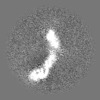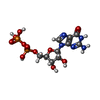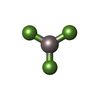+ Open data
Open data
- Basic information
Basic information
| Entry |  | |||||||||
|---|---|---|---|---|---|---|---|---|---|---|
| Title | GATOR1-RAG-RAGULATOR - GAP Complex | |||||||||
 Map data Map data | GATOR1-RAG-RAGULATOR - GAP Complex | |||||||||
 Sample Sample |
| |||||||||
 Keywords Keywords | Complex / GTPase activating protein / nutrient sensing / metabolism / HYDROLASE | |||||||||
| Function / homology |  Function and homology information Function and homology informationGATOR1 complex / regulation of cholesterol import / positive regulation of protein localization to lysosome / regulation of cell-substrate junction organization / regulation of cholesterol efflux / Gtr1-Gtr2 GTPase complex / negative regulation of kinase activity / FNIP-folliculin RagC/D GAP / Ragulator complex / protein localization to cell junction ...GATOR1 complex / regulation of cholesterol import / positive regulation of protein localization to lysosome / regulation of cell-substrate junction organization / regulation of cholesterol efflux / Gtr1-Gtr2 GTPase complex / negative regulation of kinase activity / FNIP-folliculin RagC/D GAP / Ragulator complex / protein localization to cell junction / aorta morphogenesis / regulation of TORC1 signaling / protein localization to lysosome / MTOR signalling / fibroblast migration / lysosome localization / regulation of TOR signaling / Energy dependent regulation of mTOR by LKB1-AMPK / endosome organization / Amino acids regulate mTORC1 / kinase activator activity / protein localization to membrane / cardiac muscle tissue development / vacuolar membrane / endosomal transport / ventricular septum development / lysosome organization / azurophil granule membrane / small GTPase-mediated signal transduction / TORC1 signaling / Macroautophagy / regulation of cell size / RHOJ GTPase cycle / RHOQ GTPase cycle / roof of mouth development / CDC42 GTPase cycle / tertiary granule membrane / RHOH GTPase cycle / mTORC1-mediated signalling / ficolin-1-rich granule membrane / RHOG GTPase cycle / regulation of receptor recycling / RAC2 GTPase cycle / RAC3 GTPase cycle / positive regulation of TOR signaling / enzyme-substrate adaptor activity / response to amino acid / specific granule membrane / protein-membrane adaptor activity / negative regulation of TORC1 signaling / RAC1 GTPase cycle / cellular response to nutrient levels / positive regulation of TORC1 signaling / positive regulation of autophagy / negative regulation of autophagy / GTPase activator activity / RNA splicing / guanyl-nucleotide exchange factor activity / cellular response to amino acid starvation / cholesterol homeostasis / viral genome replication / cellular response to starvation / Regulation of PTEN gene transcription / tumor necrosis factor-mediated signaling pathway / positive regulation of interleukin-8 production / TP53 Regulates Metabolic Genes / regulation of cell growth / cellular response to amino acid stimulus / phosphoprotein binding / MAP2K and MAPK activation / positive regulation of protein localization to nucleus / small GTPase binding / response to virus / GDP binding / intracellular protein localization / late endosome / late endosome membrane / glucose homeostasis / E3 ubiquitin ligases ubiquitinate target proteins / GTPase binding / Hydrolases; Acting on acid anhydrides; Acting on GTP to facilitate cellular and subcellular movement / molecular adaptor activity / positive regulation of canonical NF-kappaB signal transduction / lysosome / positive regulation of MAPK cascade / endosome membrane / intracellular signal transduction / membrane raft / protein heterodimerization activity / intracellular membrane-bounded organelle / lysosomal membrane / focal adhesion / GTPase activity / apoptotic process / ubiquitin protein ligase binding / Neutrophil degranulation / positive regulation of gene expression / DNA-templated transcription / negative regulation of apoptotic process / GTP binding Similarity search - Function | |||||||||
| Biological species |  Homo sapiens (human) Homo sapiens (human) | |||||||||
| Method | single particle reconstruction / cryo EM / Resolution: 3.9 Å | |||||||||
 Authors Authors | Egri SB / Shen K | |||||||||
| Funding support |  United States, 1 items United States, 1 items
| |||||||||
 Citation Citation |  Journal: Mol Cell / Year: 2022 Journal: Mol Cell / Year: 2022Title: Cryo-EM structures of the human GATOR1-Rag-Ragulator complex reveal a spatial-constraint regulated GAP mechanism. Authors: Shawn B Egri / Christna Ouch / Hui-Ting Chou / Zhiheng Yu / Kangkang Song / Chen Xu / Kuang Shen /  Abstract: mTORC1 controls cellular metabolic processes in response to nutrient availability. Amino acid signals are transmitted to mTORC1 through the Rag GTPases, which are localized on the lysosomal surface ...mTORC1 controls cellular metabolic processes in response to nutrient availability. Amino acid signals are transmitted to mTORC1 through the Rag GTPases, which are localized on the lysosomal surface by the Ragulator complex. The Rag GTPases receive amino acid signals from multiple upstream regulators. One negative regulator, GATOR1, is a GTPase activating protein (GAP) for RagA. GATOR1 binds to the Rag GTPases via two modes: an inhibitory mode and a GAP mode. How these two binding interactions coordinate to process amino acid signals is unknown. Here, we resolved three cryo-EM structural models of the GATOR1-Rag-Ragulator complex, with the Rag-Ragulator subcomplex occupying the inhibitory site, the GAP site, and both binding sites simultaneously. When the Rag GTPases bind to GATOR1 at the GAP site, both Rag subunits contact GATOR1 to coordinate their nucleotide loading states. These results reveal a potential GAP mechanism of GATOR1 during the mTORC1 inactivation process. | |||||||||
| History |
|
- Structure visualization
Structure visualization
| Supplemental images |
|---|
- Downloads & links
Downloads & links
-EMDB archive
| Map data |  emd_25653.map.gz emd_25653.map.gz | 197.3 MB |  EMDB map data format EMDB map data format | |
|---|---|---|---|---|
| Header (meta data) |  emd-25653-v30.xml emd-25653-v30.xml emd-25653.xml emd-25653.xml | 25.4 KB 25.4 KB | Display Display |  EMDB header EMDB header |
| Images |  emd_25653.png emd_25653.png | 72.3 KB | ||
| Filedesc metadata |  emd-25653.cif.gz emd-25653.cif.gz | 8.7 KB | ||
| Archive directory |  http://ftp.pdbj.org/pub/emdb/structures/EMD-25653 http://ftp.pdbj.org/pub/emdb/structures/EMD-25653 ftp://ftp.pdbj.org/pub/emdb/structures/EMD-25653 ftp://ftp.pdbj.org/pub/emdb/structures/EMD-25653 | HTTPS FTP |
-Related structure data
| Related structure data |  7t3bMC 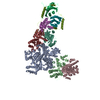 7t3aC  7t3cC M: atomic model generated by this map C: citing same article ( |
|---|---|
| Similar structure data | Similarity search - Function & homology  F&H Search F&H Search |
- Links
Links
| EMDB pages |  EMDB (EBI/PDBe) / EMDB (EBI/PDBe) /  EMDataResource EMDataResource |
|---|---|
| Related items in Molecule of the Month |
- Map
Map
| File |  Download / File: emd_25653.map.gz / Format: CCP4 / Size: 209.3 MB / Type: IMAGE STORED AS FLOATING POINT NUMBER (4 BYTES) Download / File: emd_25653.map.gz / Format: CCP4 / Size: 209.3 MB / Type: IMAGE STORED AS FLOATING POINT NUMBER (4 BYTES) | ||||||||||||||||||||||||||||||||||||
|---|---|---|---|---|---|---|---|---|---|---|---|---|---|---|---|---|---|---|---|---|---|---|---|---|---|---|---|---|---|---|---|---|---|---|---|---|---|
| Annotation | GATOR1-RAG-RAGULATOR - GAP Complex | ||||||||||||||||||||||||||||||||||||
| Projections & slices | Image control
Images are generated by Spider. | ||||||||||||||||||||||||||||||||||||
| Voxel size | X=Y=Z: 0.83 Å | ||||||||||||||||||||||||||||||||||||
| Density |
| ||||||||||||||||||||||||||||||||||||
| Symmetry | Space group: 1 | ||||||||||||||||||||||||||||||||||||
| Details | EMDB XML:
|
-Supplemental data
- Sample components
Sample components
+Entire : GATOR1-RAG-RAGULATOR - GAP Complex
+Supramolecule #1: GATOR1-RAG-RAGULATOR - GAP Complex
+Macromolecule #1: Ras-related GTP-binding protein C
+Macromolecule #2: GATOR complex protein NPRL2
+Macromolecule #3: GATOR complex protein DEPDC5
+Macromolecule #4: Ragulator complex protein LAMTOR3
+Macromolecule #5: Ragulator complex protein LAMTOR2
+Macromolecule #6: Ragulator complex protein LAMTOR5
+Macromolecule #7: Ragulator complex protein LAMTOR4
+Macromolecule #8: Ragulator complex protein LAMTOR1
+Macromolecule #9: GATOR complex protein NPRL3
+Macromolecule #10: Ras-related GTP-binding protein A
+Macromolecule #11: GUANOSINE-5'-DIPHOSPHATE
+Macromolecule #12: ALUMINUM FLUORIDE
-Experimental details
-Structure determination
| Method | cryo EM |
|---|---|
 Processing Processing | single particle reconstruction |
| Aggregation state | particle |
- Sample preparation
Sample preparation
| Buffer | pH: 7.4 |
|---|---|
| Vitrification | Cryogen name: ETHANE |
- Electron microscopy
Electron microscopy
| Microscope | FEI TITAN KRIOS |
|---|---|
| Image recording | Film or detector model: GATAN K3 BIOQUANTUM (6k x 4k) / Average electron dose: 54.2 e/Å2 |
| Electron beam | Acceleration voltage: 300 kV / Electron source:  FIELD EMISSION GUN FIELD EMISSION GUN |
| Electron optics | Illumination mode: FLOOD BEAM / Imaging mode: BRIGHT FIELD |
| Experimental equipment |  Model: Titan Krios / Image courtesy: FEI Company |
 Movie
Movie Controller
Controller



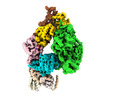




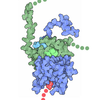

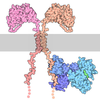


 Z (Sec.)
Z (Sec.) Y (Row.)
Y (Row.) X (Col.)
X (Col.)
















